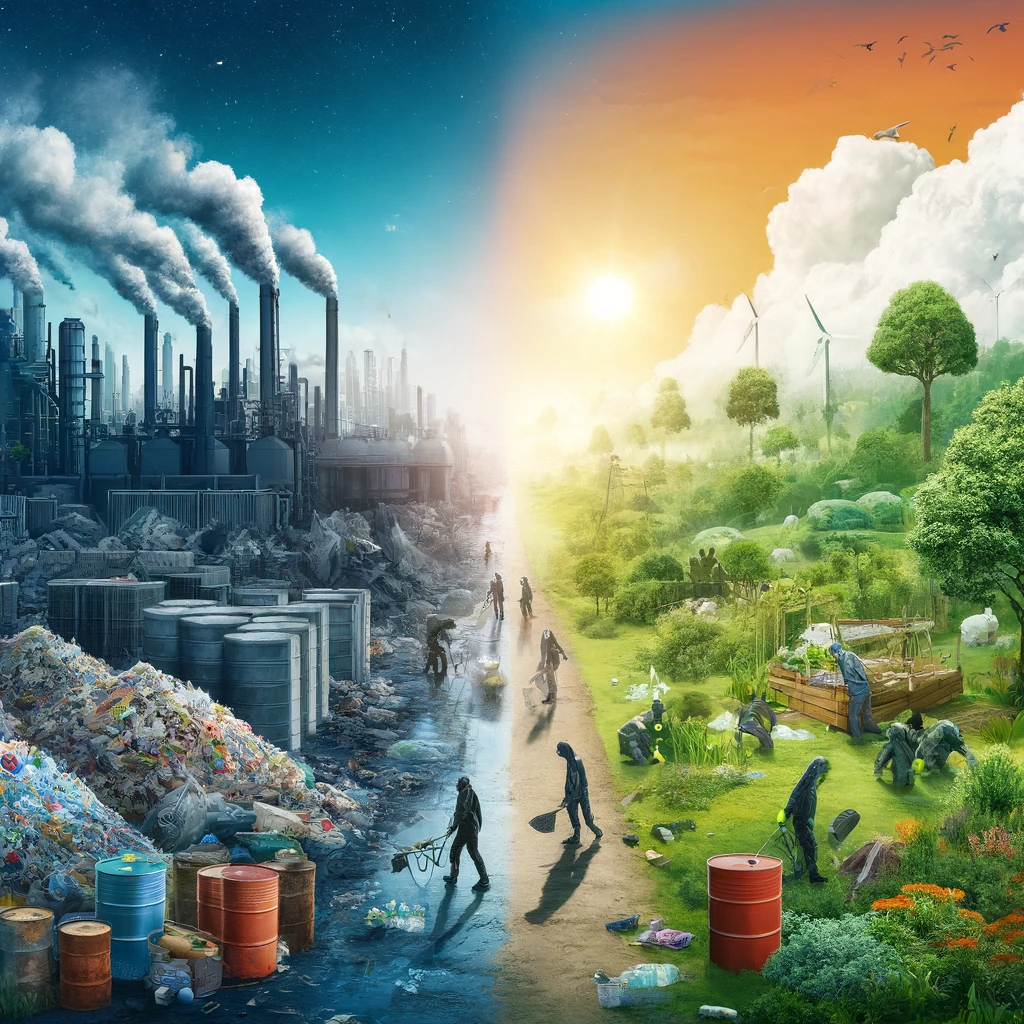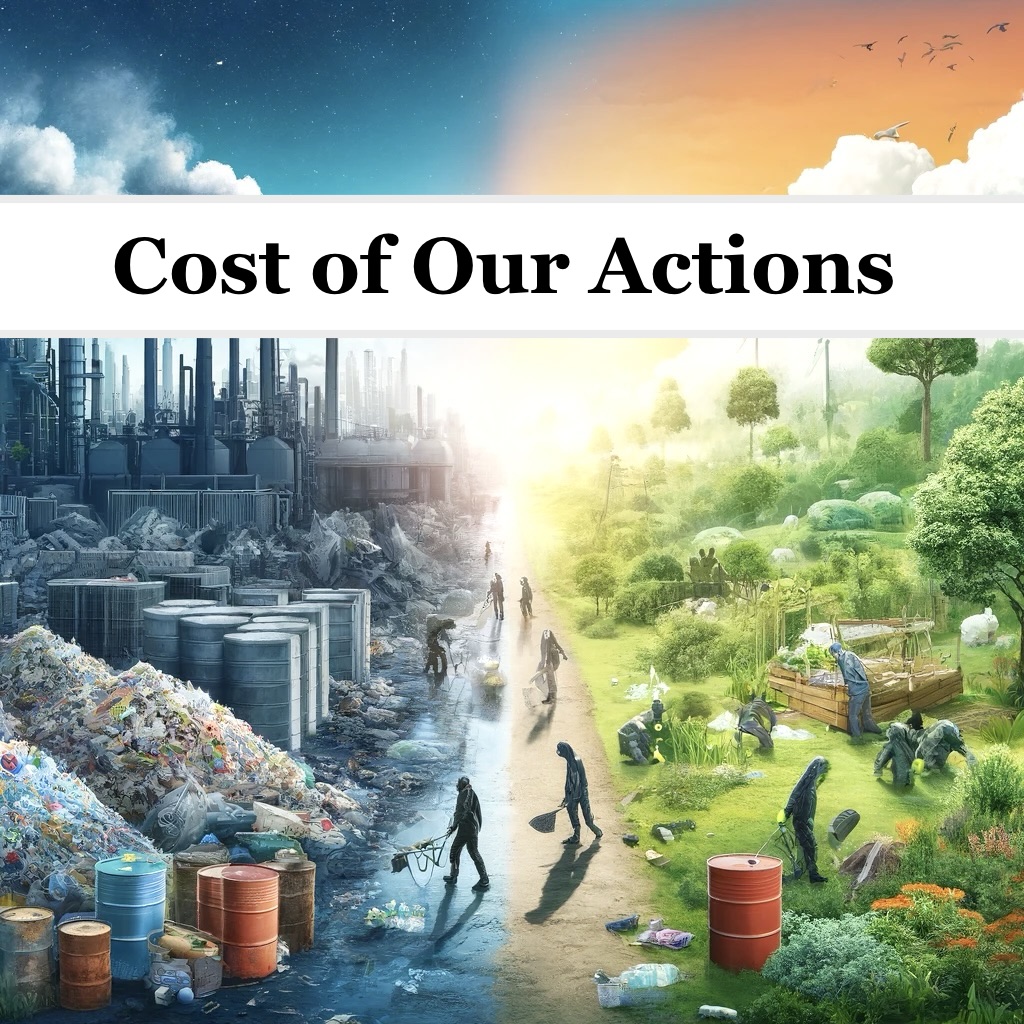Why We Should Care About Waste, Plastic, and Chemicals: The True Cost of Our Actions
A Crisis in the Making
Every day, humanity produces staggering amounts of waste, discards mountains of plastic, and uses countless chemicals in our daily lives. While these practices are often out of sight and out of mind, their impact on the environment, wildlife, and human health is monumental. It’s time to understand the true cost of these actions and why we need to care.
Individual Impact
The Waste We Produce: A Growing Problem
The global population generates over 2 billion tons of solid waste annually, and this number is projected to grow to 3.4 billion tons by 2050. A significant portion of this waste ends up in landfills or the environment, where it creates numerous problems:
- Landfills and Methane Emissions: Landfills are a major source of methane, a potent greenhouse gas that contributes to climate change. Methane is far more effective at trapping heat in the atmosphere than carbon dioxide.
- Ocean Pollution: Millions of tons of waste, including plastics, find their way into the oceans each year, harming marine life and ecosystems.
- Economic Costs: Managing waste is expensive, with countries spending billions annually on collection and disposal.
10 Easy Ways to Reduce Plastic Waste and Save Money
The Plastic Crisis: More Than an Eyesore
Plastic has revolutionized industries and improved countless aspects of life, but its durability has created an environmental disaster:
- Unprecedented Longevity: Plastics can take 500 to 1,000 years to degrade, persisting in the environment for generations.
- Microplastics Everywhere: As plastics break down, they form microplastics, which are now found in soil, water, air, and even human bodies. These tiny particles can carry harmful chemicals and enter the food chain.
- Wildlife Impact: Over 1 million marine animals die each year due to plastic ingestion or entanglement. Sea turtles mistake plastic bags for jellyfish, and birds feed plastic to their chicks.
What You Can Do: Opt for alternatives like glass, metal, or biodegradable materials. Support bans on single-use plastics and participate in clean-up efforts.
Facts about Microplastics
Chemicals in Everyday Life: Invisible Dangers
Modern life relies on a plethora of chemicals, from cleaning products to pesticides. While many are useful, their widespread use comes with hidden costs:
- Toxicity in Ecosystems: Chemicals like pesticides and industrial runoff contaminate soil and water, harming plants, animals, and humans.
- Human Health Risks: Prolonged exposure to certain chemicals is linked to cancer, hormonal disruptions, and developmental issues.
- Air and Water Pollution: Volatile organic compounds (VOCs) from industrial processes contribute to smog, while untreated chemical waste contaminates water sources.
Microplastic in Our Body
Frighting Fragrances
Plastiglomerates: A New Type of Pollution and Its Harmful Effects
Polyvinyl Alcohol (PVA)
The True Cost: Beyond Dollars
The environmental degradation caused by waste, plastic, and chemicals has far-reaching consequences that money alone cannot fix:
- Biodiversity Loss: Every year, species are pushed closer to extinction due to pollution, habitat destruction, and climate change.
- Climate Change Acceleration: Greenhouse gases from waste and chemical production exacerbate global warming, leading to extreme weather and rising sea levels.
- Human Suffering: Communities, especially in developing nations, bear the brunt of environmental damage, facing health crises and economic hardship.
What You Can Do: Educate yourself and others, support green initiatives, and vote for leaders committed to sustainability.
Microplastics Impact
NanoPlastics
A Shared Responsibility
The waste we produce, the plastic we waste, and the chemicals we use are not someone else’s problem—they’re ours. The choices we make today will shape the future of our planet. By caring about these issues and taking action, we can create a cleaner, healthier, and more sustainable world for generations to come.
The Truth about Recycling

Spending time in nature and contributing to its well-being can significantly enhance happiness and overall mental health. Immersing yourself in natural surroundings reduces stress, improves mood, and fosters a sense of connection to something larger than yourself. Acts like planting trees, cleaning up parks, or supporting wildlife conservation can give a profound sense of purpose and accomplishment, amplifying feelings of joy and fulfillment. Nature’s calming beauty and rhythmic simplicity have a grounding effect, helping people feel more present and grateful. By nurturing the environment, we nurture ourselves, creating a virtuous cycle of happiness and harmony with the world around us.
Eco-Ways to Happiness
Step Into Nature:
Saving by Gardening
Actions Taken to Prevent Waste:
- Recycling Programs: Many communities and organizations have established systems to recycle paper, plastic, glass, and metals, reducing waste sent to landfills.
- Composting Initiatives: Organic waste is being composted to create nutrient-rich soil, reducing food waste and methane emissions from landfills.
- Plastic Bans and Regulations: Numerous cities and countries have banned single-use plastics like straws, bags, and utensils, encouraging reusable alternatives.
- Circular Economy Practices: Companies are designing products with reuse and recycling in mind, extending product lifespans and reducing raw material usage.
- Waste-to-Energy Plants: Facilities convert waste into energy, reducing landfill use while generating power.
- Public Awareness Campaigns: Governments and NGOs have launched educational campaigns to promote waste reduction behaviors.
- Extended Producer Responsibility (EPR): Laws require manufacturers to manage the end-of-life disposal of their products, encouraging sustainable design.
How to Compost: A Guide for Beginners
The Truth about Recycling
What Else Can We Do?
- Adopt Minimalist Practices: Focus on buying only what is necessary and opting for quality over quantity to reduce overall consumption.
- Enhance Recycling Technology: Invest in advanced sorting and recycling systems to improve efficiency and reduce contamination in recycling streams.
- Support Local Repair Shops: Encourage repairing rather than discarding items to extend their usability.
- Community Sharing Programs: Promote sharing economies, such as tool libraries or car-sharing services, to reduce the need for individual ownership.
- Incorporate Zero-Waste Lifestyles: Advocate for bulk buying, reusable containers, and reduced packaging in daily routines.
- Policy Advocacy: Push for stricter regulations on waste management, incentives for businesses that reduce waste, and penalties for excessive waste generation.
- Promote Sustainable Innovation: Support startups and companies working on biodegradable materials, upcycling, or waste reduction technologies.
- Engage in Grassroots Movements: Join or organize community cleanups and educational workshops to inspire collective action.
Through a combination of systemic change and individual action, we can further minimize waste and its impact on the planet.
Massachusetts Passes Landmark Climate and Plastics Bill
Solar Benefits
The Great Pacific Garbage Patch
The Perils of Plastic Bottles





Thank you for the insight. What we do now really does matter. We don’t want our legacy to be waste
We all need to be more mindful of our actions. We’re leaving behind too much waste in so many ways.
This post made me think about how every little thing that every one does really matter in the future, because we’re producing so much waste that will out live us all!
This is a thoughtful article with helpful information. Most people don’t think about the impact of their actions on the future, but we won’t have much of a future if we keep doing what we’ve been doing. We really need a better way to do everything. Unfortunately, commercialism has taken over instead of efficiency. Big companies need policy changes to take the right actions. They have put profits above all and it needs to change. That change can start with us and our elected officials. We need to vote for people who care about the future and the impact their policies make on our world